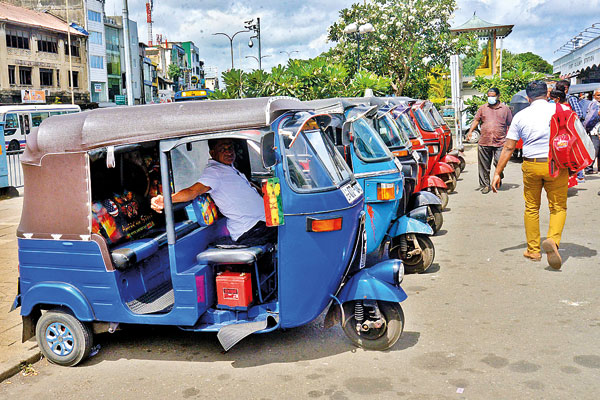News
Wheels within wheels in three-wheeler operations
View(s):By Yoshitha Perera
Following the Cabinet decisions to regulate three-wheelers, school vans and office transportation services as public transportation under the National Transport Commission (NTC), NTC Director General Nilan Miranda said the National Transport Act amendments have been forwarded to the Legal Draftsman.
The decision to create a Three-Wheel Regulative Authority from funds obtained from the previous budget was delayed by more than a year.
To operate this separate authority for three-wheeler regulation, former finance minister Basil Rajapaksa set aside Rs. 600 million in the budget. However, the authority was not established, and the pertinent law governing three-wheelers has been sitting in the Legal Draftsman’s Department for more than a year.

Fort Railway Station's three-wheel park. Pic by Eshan Fernando
In reaction to the fuel crisis, a number of anomalies in the operation of three-wheelers have been noted, and the Government agreed during the latest Cabinet meeting to regulate the para-transit sector, three-wheelers, school vans and office transport services under the NTC.
These measures were worked out because many three-wheel passengers had complained they were being charged unfair and excessive rates.
At the weekly news conference to announce Cabinet decisions, Transport Minister Bandula Gunawardena promised the Government would come up with a method to control the three-wheeler passenger service under the NTC, within a month.
Although the regulation of three-wheelers had received special attention, some three-wheeler drivers who operated passenger transport services in the Western province had expressed their objection to these measures.
Professional three-wheeler driver Nalin Liyange had operated from Fort Railway Station’s three-wheel park for more than 18 years. He claimed those participating in unions and organisations approach ministries and request the establishment of regulatory bodies, but the efforts were not successful because the union members played certain roles and were paid a salary.
“Our entry into this parking lot is limited and we need to permission. We are not allowed to remain here on an ongoing basis. In 2013 and 2014, we made our recommendations to regulate this sector. But the then President Mahinda Rajapaksa, did not take action. There will be no more action taken. The governments are merely using us to build their own voter bases. As a result, we oppose three-wheeler regulation,” he said.
Operating in Sri Lanka now the number of three-wheelers is nearly 1.2 million, and around 500,000 of the owners are licenced cab drivers.
For more than 20 years, P.V.A. Pushpakumara had been a three-wheeler driver operating from a Grandpass three-wheel park. He believed without creating regulating entities, the Government must simplify the fuel distribution process for hired three wheeler drivers.
“We are unable to conduct ourselves as professional three-wheeler drivers. We request the government to supply fuel in a suitable manner. The Quick Response (QR) code for fuel is a good idea, however we only receive fuel once a week and that quota is not enough. So how can we get hires? Additionally, we must include increasing charges. We pay a lot of money for fuel as three-wheeler drivers. We do not care about these regulating agencies as long as the fuel distribution takes place properly. We are prepared to make passenger transportation fair,” he said.
The NTC held a workshop on Friday, and it was reported that almost 120 three-wheeler drivers from several three-wheeler associations attended. They provided their recommendations for creating the regulatory agency.
Western Province Road Passenger Transport Authority Superintendent Jagath Perera said members of the three-wheeler groups had consented to the establishment of the regulating body and agreed to charge Rs. 150 for each kilometre.
All-Island Three-Wheeler Drivers Association President Lalith Dharmasekara said this action was taken following discussions with representatives from the Power and Energy and Transport Ministries.
“The actual number of three-wheelers used for full-time passenger transport was the topic of contention. There are more than 1.1 million three-wheelers operating in the country, but only 900,000 of them are registered using the current QR code system, and only 700,000 of them have received fuel thus far, according to the Power and Energy Ministry. Therefore, even while we are certain that there are relatively few three-wheelers engaged in full-time passenger transport, we lack the numbers to support this,” said Mr Dharmasekara.
He said the process of identifying three-wheelers used only for passenger transportation would start in September.
It was alleged that because the QR code system only provided fuel for one day, some three-wheeler drivers resorted to paying a certain amount to the pumpers at the filling stations to get more fuel.
Three-wheeler drivers claimed the five litres of fuel allotted to them each week was insufficient for a week of travel. They asked for a minimum of five litres a day, six days a week, for a total of 30 litres each week.
The best way to say that you found the home of your dreams is by finding it on Hitad.lk. We have listings for apartments for sale or rent in Sri Lanka, no matter what locale you're looking for! Whether you live in Colombo, Galle, Kandy, Matara, Jaffna and more - we've got them all!

